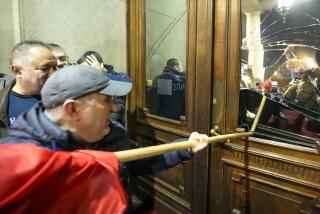Turnout in Serbia Presidential Election Falls Short Once More
BELGRADE, Yugoslavia — For the second time this fall, Serbia failed to elect a president as too few voters showed up Sunday to cast ballots, exit polls showed.
The state electoral commission said turnout was about 45% of the 6.5 million eligible voters, below the required 50% and slightly less than when the vote failed in October.
The failed vote heralds a continued period of uncertainty and power battles among the politicians who ousted Yugoslav President Slobodan Milosevic.
Current Yugoslav President Vojislav Kostunica, a self-styled moderate nationalist, was the top vote-getter, winning 58%, independent observers said.
Vojislav Seselj of the ultranationalist Serbian Radical Party got 36%. Borislav Pelevic, an expert kick-boxer and candidate of the Serbian Unity Party, founded by late Serb warlord Zeljko Raznatovic, a.k.a. Arkan, had 3.4%, election monitors said.
Early today, Kostunica denounced the 50% turnout requirement and said the number of eligible voters was “inflated” with dead and nonexistent people. He said he will appeal to the Serbian constitutional court and international institutions.
Kostunica also came first in a September election but did not secure an absolute majority. In October’s failed runoff, he outpolled a candidate backed by his archrival, Serbian Prime Minister Zoran Djindjic.
Kostunica and Djindjic, who cultivates the image of a pro-Western economic reformer, were the two leading figures in the alliance that toppled Milosevic. But they have since been engaged in a power struggle.
It was unclear what would happen if officials declared Sunday’s vote invalid. The constitution has no such provisions.
Kostunica indicated previously that he would seek early parliamentary elections. His rival would like to see the law changed to have the president elected by Serbia’s parliament.
That would give Djindjic a chance to nominate a candidate of his choice who would be assured of victory, because Djindjic controls the legislature.
Many voters stayed home amid widespread apathy, analysts said.
“What is there to vote for when nothing will change after Sunday?” asked Radmila Micic, an unemployed economist and mother of two. “I’d better stay home Sunday and see to lunch.”
More to Read
Sign up for Essential California
The most important California stories and recommendations in your inbox every morning.
You may occasionally receive promotional content from the Los Angeles Times.










